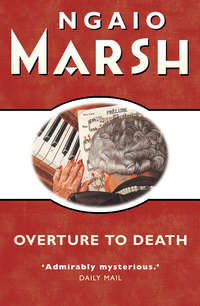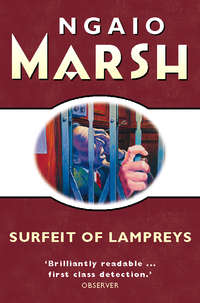
Полная версия
Singing in the Shrouds

Ngaio Marsh
Singing in the Shrouds

Copyright
This novel is entirely a work of fiction. The names, characters and incidents portrayed in it are the work of the author’s imagination. Any resemblance to actual persons, living or dead, events or localities is entirely coincidental.
Harper
An imprint of HarperCollinsPublishers Ltd.
1 London Bridge Street
London SE1 9GF
www.harpercollins.co.uk
First published in Great Britain by Ngaio Marsh Ltd 1958
Copyright © 1958 Ngaio Marsh Ltd
Ngaio Marsh asserts the moral right to be identified as the author of this work
A catalogue copy of this book is available from the British Library
All rights reserved under International and Pan-American Copyright Conventions. By payment of the required fees, you have been granted the non-exclusive, non-transferable right to access and read the text of this ebook on-screen. No part of this text may be reproduced, transmitted, downloaded, decompiled, reverse engineered, or stored in or introduced into any information storage and retrieval system, in any form or by any means, whether electronic or mechanical, now known or hereinafter invented, without the express written permission of HarperCollins ebooks
HarperCollinsPublishers has made every reasonable effort to ensure that any picture content and written content in this ebook has been included or removed in accordance with the contractual and technological constraints in operation at the time of publication
Source ISBN: 9780006159582
Ebook Edition © OCTOBER 2009 ISBN: 9780007344741
Version: 2016-08-30
Dedication
FOR

Contents
Title Page
Copyright
Dedication
Cast of Characters
1 Prologue with Corpse,
2 Embarkation
3 Departure
4 Hyacinths
5 Before Las Palmas
6 Broken Doll
7 After Las Palmas
8 Sunday the Tenth
9 Thursday the Fourteenth
10 Aftermath
11 Arrest
12 Cape Town
Keep Reading
Also by the Author
About the Publisher
Cast of Characters
PC Moir A Taxi-driver A Sailor Mrs Dillington-Blick Her Friend Mr Cuddy A draper Mrs Cuddy His wife Miss Katherine Abbott An authority on church music Mr Philip Merryman A retired schoolmaster Father Jourdain An Anglo-Catholic priest His Fellow-Cleric Jemima Carmichael Dr Timothy Makepiece Medical Officer, Cape Farewell Mr Aubyn Dale A celebrity of commercial television His dearest friend Their dearest male friend Their dearest female friend Mr Donald McAngus A philatelist Dennis A steward A Wireless Officer Captain Bannerman Master, Cape Farewell Superintendent Roderick Alleyn ClD, New Scotland YardCHAPTER 1
Prologue with Corpse
In the Pool of London and farther east all through the dockyards the fog lay heavy. Lights swam like moons in their own halos. Insignificant buildings, being simplified, became dramatic. Along the Cape Line Company’s stretch of wharfage the ships at anchor loomed up portentously: Cape St Vincent, Glasgow. Cape Horn, London. Cape Farewell, Glasgow. The cranes that served these ships lost their heads in the fog. Their gestures as they bowed and turned became pontifical.
Beyond their illuminated places the dockyards vanished. The gang loading the Cape Farewell moved from light into nothingness. Noises were subdued and isolated and a man’s cough close at hand was more startling than the rattle of winches.
Police Constable Moir, on duty until midnight, walked in and out of shadows. He breathed the soft cold smell of wet wood and heard the slap of the night tide against the wharves. Acres and acres of shipping and forests of cranes lay around him. Ships, he thought romantically, were, in a sort of way, like little worlds. Tied up to bollards and lying quiet enough but soon to sail over the watery globe as lonely as the planets wandering in the skies. He would have liked to travel. He solaced himself with thoughts of matrimony, promotion and, when the beat was getting him down a bit, of the Police Medal and sudden glory. At a passageway between buildings near the Cape Farewell he walked slower because it was livelier there. Cars drove up: in particular an impressive new sports car with a smashing redhead at the wheel and three passengers, one of whom he recognized with interest as the great TV personality, Aubyn Dale. It was evident that the others, a man and woman, also belonged to that mysterious world of glaring lights, trucking cameras and fan mails. You could tell by the way they shouted ‘darling’ at each other as they walked through the passageway.
PC Moir conscientiously moved himself on. Darkness engulfed him, lights revealed him. He had reached the boundary of his beat and was walking along it. A bus had drawn up at the entry to the waterfront and he watched the passengers get out and plod, heads down and suitcases in hand, towards the Cape Farewell – two clergymen, a married couple, a lush bosomy lady and her friend, a benevolent-looking gentleman, a lovely young lady with a miserable expression and a young gentleman who lagged behind and looked as if he’d like to ask her to let him carry her luggage. They walked into the fog, became phantoms and disappeared down the passageway in the direction of the wharf.
For the next two and a half hours PC Moir patrolled the area. He kept an eye on occasional drunks, took a look at parked vehicles, observed ships and pubs and had an instinctive ear open for any untoward sounds. At half past eleven he took a turn down the waterfront and into a region of small ambiguous ships, ill-lit and silent, scarcely discernible in the fog that had stealthily accumulated about them.
‘Quiet,’ he thought. ‘Very quiet, this stretch.’
By a strange coincidence (as he was afterwards and repeatedly to point out) he was startled at this very moment by a harsh mewing cry.
‘Funny,’ he thought. ‘You don’t often seem to hear seagulls at night. I suppose they go to sleep like Christians.’
The cry sounded again but shortly as if somebody had lifted the needle from a record. Moir couldn’t really tell from what direction the sound had come but he fancied it was from somewhere along the Cape Company’s wharf. He had arrived at the farthest point of his beat and he now returned. The sounds of activity about the Cape Farewell grew clear again. She was still loading.
When he got back to the passageway he found a stationary taxi wreathed in fog and looking desolate. It quite surprised him on drawing nearer to see the driver, motionless over the wheel. He was so still that Moir wondered if he was asleep. However he turned his head and peered out.
‘Evening, mate,’ Moir said. ‘Nice night to get lost in.’
‘And that’s no error,’ the driver agreed hoarsely. ‘’Ere!’ he continued, leaning out and looking fixedly at the policeman. ‘You seen anybody?’
‘How d’you mean, seen?’
‘A skirt. Wiv a boxerflahs.’
‘No,’ Moir said. ‘Your fare, would it be?’
‘Ah! My fare! ’Alf a minute at the outside she says, and nips off lively. ’Alf a minute! ’Alf a bloody ar, more likely.’
‘Where’d she go? Ship?’ asked Moir, jerking his head in the direction of the Cape Farewell.
‘ ’Course. Works at a flah shop. Cartin’ rahnd bokays to some silly bitch wot’ll frow ’em to the fishes, like as not. Look at the time: arpas eleven. Flahs!’
‘P’raps she couldn’t find the recipient,’ PC Moir ventured, using police-court language out of habit.
‘P’raps she couldn’t find the flippin’ ship nor yet the ruddy ocean! P’raps she’s drahned,’ said the taxi driver in a passion.
‘Hope it’s not all that serious, I’m sure.’
‘Where’s my fare comin’ from? Twelve and a tanner gone up and when do I get it? Swelp me Bob if I don’t cut me losses and sling me ’ook.’
‘I wouldn’t do that,’ PC Moir said. ‘Stick it a bit longer, I would. She’ll be back. Tell you what, Aubyn Dale’s on board that ship.’
‘The TV bloke that does the Jolyon Swimsuits commercial and the “Pack up Your Troubles” show?’
‘That’s right. Dare say she’s spotted him and can’t tear herself away. They go nuts over Aubyn Dale.’
‘Silly cows,’ the taxi driver muttered. ‘Telly!’
‘Why don’t you stroll along to the ship and get a message up to her?’
‘Why the hell should I!’
‘Come on. I’ll go with you. I’m heading that way.’
The driver muttered indistinguishably but he clambered out of his taxi and together they walked down the passageway. It was a longish passage and very dark, but the lighted wharf showed up mistily at the far end. When they came out they were almost alongside the ship. Her stern loomed up through the fog with her name across it.
CAPE FAREWELL
GLASGOW
Her after and amidships hatches had been shut down and, forward, her last load was being taken. Above her lighted gangway stood a sailor, leaning over the rails. PC Moir looked up at him.
‘Seen anything of a young lady who brought some flowers on board, mate?’ he asked.
‘Would that be about two hours back?’
‘More like half an hour.’
‘There’s been nobody like that since I first come on and that’s eight bells.’
‘ ’Ere!’ said the driver. ‘There must of.’
‘Well, there wasn’t. I been on duty here constant. No flowers come aboard after eight bells.’
PC Moir said: ‘Well, thanks, anyway. P’raps she met someone on the wharf and handed them over.’
‘No flowers never came aboard with nobody. Not since when I told you. Eight bells.’
‘Awright, awright, we ’eard,’ said the driver ungratefully. ‘Bells!’
‘Are your passengers all aboard?’ Moir asked.
‘Last one come aboard five minutes back. All present and correct including Mr Aubyn Dale. You’d never pick him, though, now he’s slaughtered them whiskers. What a change! Oh, dear!’ The sailor made a gesture that might have indicated his chin; or his neck. ‘I reckon he’d do better to grow again,’ he said.
‘Anyone else been about? Anyone you couldn’t place, at all?’
‘Hallo-allo! What’s wrong, anyway?’
‘Nothing so far as I know. Nothing at all.’
The sailor said: ‘it’s been quiet. The fog makes it quiet.’ He spat carefully overboard. ‘I heard some poor sod singing,’ he said. ‘Just the voice: funny sort of voice too. Might of been a female and yet I don’t reckon it was. I didn’t rekkernize the chune.’
Moir waited a moment and then said: ‘Well, thanks again, sailor, we’ll be moving along.’
When he had withdrawn the driver to a suitable distance he said, coughing a little because a drift of fog had caught him in the throat: ‘What was she like, daddy? To look at?’
The taxi driver gave him a jaundiced and confused description of his fare in which the only clear glimpse to emerge was of a flash piece with a lot of yellow hair done very fancy. Pressed further the driver remembered pin-heels. When she left the taxi the girl had caught her foot in a gap between two planks and had paused to adjust her shoe.
Moir listened attentively.
‘Right you are,’ he said. ‘Now, I think I’ll just take a wee look round, daddy. You go back to your cab and wait. Wait, see?’
This suggestion evoked a fresh spate of expostulation but Moir became authoritative and the driver finally returned to his cab. Moir looked after him for a moment and then walked along to the forward winch where he was received by the shore gang with a degree of guarded curiosity that in some circles is reserved for the police. He asked them if they had seen the girl and repeated the driver’s description. None of them had done so.
As he was turning away one of the men said: ‘What seems to be the trouble anyway, Copper?’
‘Not to say trouble,’ Moir called back easily. A second voice asked derisively: ‘Why don’t you get the Flower Killer, Superintendent?’
Moir said good-naturedly: ‘We’re still hoping, mate.’ And walked away: a man alone on his job.
He began to look for the girl from the flower shop. There were many dark places along the wharf. He moved slowly, flashing his lamp into the areas under platforms, behind packing-cases, between buildings and dumps of cargo and along the dark surface of the water where it made unsavoury but irrelevant discoveries.
It was much quieter now aboard the Farewell. He heard the covers go down on the forward hatch and glancing up could just see the Blue Peter hanging limp in the fog. The gang that had been loading the ship went off through one of the sheds and their voices faded into silence.
He arrived back at the passageway. Beyond its far end the taxi still waited. On their way through here to the wharf he and the driver had walked quickly; now he went at a snail’s pace, using his flashlight. He knew that surfaces which in the dark and fog looked like unbroken walls, were in fact the rear ends of sheds with a gap between them. There was an alley opening off the main passage and this was dark indeed.
It was now one minute to midnight and the Cape Farewell, being about to sail, gave a raucous unexpected hoot like a gargantuan belch. It jolted PC Moir in the pit of his stomach.
With a sudden scrabble a rat shot out and ran across his boots. He swore, stumbled and lurched sideways. The light from his flashlamp darted eccentrically up the side alley, momentarily exhibiting a high-heeled shoe with a foot in it. The light fluttered, steadied and returned. It crept from the foot along a leg, showing a red graze through the gap in its nylon stocking. It moved on and came to rest at last on a litter of artificial pearls and fresh flowers scattered over the breast of a dead girl.
CHAPTER 2
Embarkation
At seven o’clock on that same evening an omnibus had left Euston Station for the Royal Albert Docks.
It had carried ten passengers, seven of whom were to embark in the Cape Farewell, sailing at midnight for South Africa. Of the remainder, two were seeing-off friends while the last was the ship’s doctor, a young man who sat alone and did not lift his gaze from the pages of a formidable book.
After the manner of travellers, the ship’s passengers had taken furtive stock of each other. Those who were escorted by friends speculated in undertones about those who were not.
‘My dear!’ Mrs Dillington-Blick ejaculated. ‘Honestly? Not one!’
Her friend made a slight grimace in the direction of the doctor and raised her eyebrows. ‘Not bad?’ she mouthed. ‘Noticed?’
Mrs Dillington-Blick shifted her shoulders under their mantling of silver fox and turned her head until she was able to include the doctor in an absent-minded glance.
‘I hadn’t noticed,’ she confessed and added, ‘Rather nice? But the others! My dear! Best forgotten! Still – ’
‘There are the officers,’ the friend hinted slyly.
‘My dear!’
They caught each other’s eyes and laughed again, cosily. Mr and Mrs Cuddy in the seat in front of them heard their laughter. The Cuddys could smell Mrs Dillington-Blick’s expensive scent. By turning their heads slightly they could see her reflection in the window-pane, like a photomontage richly floating across street lamps and the façades of darkened buildings. They could see the ghosts of her teeth, the feather in her hat, her earrings, the orchids on her great bust and her furs.
Mrs Cuddy stiffened in her navy overcoat and her husband smiled thinly. They, too, exchanged glances and thought of derisive things to say to each other when they were private in their cabin.
In front of the Cuddys sat Miss Katherine Abbott; alone, neat and composed. She was a practised traveller and knew that the first impression made by fellow-passengers is usually contradicted by experience. She rather liked the rich sound of Mrs Dillington-Blick’s laughter and deplored what she had heard of the Cuddy accent. But her chief concern at the moment was for her own comfort: she disliked being ruffled and had chosen her seat in the middle of the bus because people would be unlikely to brush past her and she was out of the draught when the door opened. In her mind she checked over the contents of her two immaculately packed suitcases. She travelled extremely light because she loathed what she called the ‘fussation’ of heavy luggage. With a single exception she carried nothing that was not positively essential. She thought now of the exception, a photograph in a leather case. To her fury her eyes began to sting. ‘I’ll throw it overboard,’ she thought. ‘That’ll larn her.’
The man in front of her turned a page of his newspaper and through her unshed tears Miss Abbott read a banner headline: ‘Killer Who Says It With Flowers. Still no arrest.’ She had longish sight and by casually leaning forward she was able to read the paragraph underneath.
‘The identity of the sex-murderer who sings as he kills and leaves flowers by the bodies of his victims is still unknown. Investigations leading to hundreds of interviews have proved clueless. Here (left) is a new snapshot of piquant Beryl Cohen, found strangled on the 15th January, and (right) a studio portrait of Marguerite Slatters, the second victim of a killer who may well turn out to be the worst of his kind since Jack the Ripper. Superintendent Alleyn (inset) refuses to make a statement, but says the police will welcome information about Beryl’s movements during her last hours (see page 6, 2nd column).’
Miss Abbott waited for the owner of the newspaper to turn to page 6 but he neglected to do so. She stared greedily at the enlarged snapshot of piquant Beryl Cohen and derisively at the inset. Superintendent Alleyn, grossly disfigured by the exigencies of reproduction in newsprint, stared dimly back at her.
The owner of the paper began to fidget. Suddenly he turned his head, obliging Miss Abbott to throw back her own and stare vaguely at the luggage rack where she immediately spotted his suitcase with a dangling label: ‘P. Merryman, Passenger, S.S. Cape Farewell.’ She had an uncomfortable notion that Mr Merryman knew she had been reading over his shoulder and in this she was perfectly right.
Mr Philip Merryman was fifty years old and a bachelor. He was a man of learning and taught English in one of the less distinguished of the smaller public schools. His general appearance, which was highly deceptive, corresponded closely with the popular idea of a schoolmaster, while a habit of looking over the tops of his spectacles and ruffling his hair filled in the outlines of this over-familiar picture. To the casual observer Mr Merryman was perfect Chips. To his intimates he could be hell.
He was fond of reading about crime, whether fictitious or actual, and had dwelt at some length on the Evening Herald’s piece about The Flower Killer as, in its slipshod way, it called this undetected murderer. Mr Merryman deplored journalese and had the poorest possible opinion of the methods of the police but the story itself quite fascinated him. He read slowly and methodically, wincing at stylistic solecisms and bitterly resentful of Miss Abbott’s trespassing glances. ‘Detested kite!’ Mr Merryman silently apostrophized her. ‘Blasts and fogs upon you! Why in the names of all the gods at once, can you not buy your own disnatured newspaper!’
He turned to page six, moved the Evening Herald out of Miss Abbott’s line of sight, read column two as quickly as possible, folded the newspaper, rose and offered it to her with a bow.
‘Madam,’ Mr Merryman said, ‘allow me. No doubt you prefer, as I confess I do, the undisputed possession of your chosen form of literature.’
Miss Abbott’s face darkened into a rich plum colour. In a startlingly deep voice she said: ‘Thank you: I don’t care for the evening paper.’
‘Perhaps you have already seen it?’
‘No,’ said Miss Abbott loudly. ‘I haven’t and what’s more I don’t want to. Thank you.’
Father Charles Jourdain muttered whimsically to his brother-cleric: ‘Seeds of discord! Seeds of discord!’ They were in the seat opposite and could scarcely escape noticing the incident.
‘I do hope,’ the brother-cleric murmured, ‘that you find someone moderately congenial.’
‘In my experience there is always someone.’
‘And you are an experienced traveller,’ the other sighed, rather wistfully.
‘Would you have liked the job so much, Father? I’m sorry.’
‘No, no, no, please don’t think it for a moment, really. I would carry no weight in Durban. Father Superior, as always, has made the wisest possible choice. And you are glad to be going – I hope?’
Father Jourdain waited for a moment and then said: ‘Oh, yes. Yes. I’m glad to go.’
‘It will be so interesting. The Community in Africa – ’
They settled down to talk Ango-Catholic shop.
Mrs Cuddy, overhearing them, smelt Popery.
The remaining ship’s passenger in the bus took no notice at all of her companions. She sat in the front seat with her hands thrust deep into the pockets of her camel-hair coat. She had a black zouave hat on the back of her head and a black scarf wound skilfully about her neck and a great studded black belt round her waist. She was so good-looking that all the tears she had shed still left her attractive. She was not crying now. She tucked her chin into her scarf and scowled at the bus driver’s back. Her name was Jemima Carmichael. She was twenty-three and had been crossed in love.
The bus lurched up Ludgate Hill. Dr Timothy Makepiece put down his book and leant forward, stooping, to see the last of St Paul’s. There it was, fabulous against the night sky. He experienced a sensation which he himself would have attributed, no doubt correctly, to a disturbance of the nervous ganglions but which laymen occasionally describe as a turning over of the heart. This must be, he supposed, because he was leaving London. He had come to that conclusion when he found he was no longer staring at the dome of St Paul’s but into the eyes of the girl in the front seat. She had turned, evidently with the same intention as his own, to look out and upwards.








